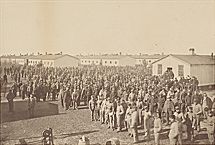| Entries |
| C |
|
Camp Douglas
|

|
Escapes were frequent from the camp, but only the abortive November 1864 “Chicago Conspiracy” roused broad concern. Federal informants foiled an ill-conceived attempt by local antiwar activists and die-hard prisoners to disrupt the 1864 election with a mass prison break.
Like all Civil War prisons, Camp Douglas had a high mortality rate: one prisoner in seven died in Chicago. Poor sanitation, hastily constructed buildings, and harsh weather conditions were to blame. In June 1862 a U.S. Sanitary Commission agent decried the camp's “foul sinks,” “unventilated and crowded barracks,” and “soil reeking with miasmatic accretions” as “enough to drive a sanitarian to despair.” By the end of the war more than 4,000 rebels had died in the camp.
The Encyclopedia of Chicago © 2004 The Newberry Library. All Rights Reserved. Portions are copyrighted by other institutions and individuals. Additional information on copyright and permissions.